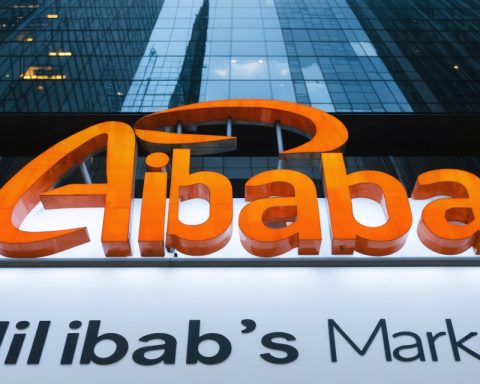As Donald Trump embarks on his second term, financial analysts are buzzing about the potential resurgence of the “Trump Trade.” This phenomenon is characterized by expectations of deregulation, tax incentives, and substantial investment in infrastructure, prompting a rally in stocks linked to Trump’s policies.
An unexpected twist came during Trump’s inauguration when tech titans like Jeff Bezos, Mark Zuckerberg, and Sundar Pichai in attendance highlighted a broader bipartisan interest in technology. Trump’s promises during his campaign about advancing artificial intelligence (AI) have sparked initiatives like the ambitious $500 billion Stargate project, designed to boost the United States’ standing in AI technology. Key players in this initiative include Nvidia, Microsoft, and Oracle.
Nvidia, founded in 1993, stands out as a leader in AI semiconductors, with its stock surging by an impressive 142% in the past year. The company not only leads in GPU production for gaming but also showcases robust financial health, reporting revenues of $35.1 billion in its third quarter, surpassing estimates.
This growth trajectory is bolstered by Nvidia’s pivotal involvement in the Stargate initiative that seeks to enhance AI capabilities. The launch of powerful new chips like the H100 Tensor Core further exemplifies Nvidia’s commitment to leading the AI and machine learning revolution.
The consensus among analysts remains overwhelmingly optimistic, with a “Strong Buy” rating for Nvidia stock, suggesting substantial growth potential on the horizon.
Impact of the Trump Trade on Society and Global Economy
As the prospect of the “Trump Trade” unfolds, its implications stretch far beyond Wall Street, touching every facet of society, culture, and the global economy. The anticipated deregulation and tax incentives may invigorate domestic markets, but they can also foster income inequality and widen the wealth gap. As corporations reap the benefits of reduced regulations, there is concern that the gains could disproportionately favor the affluent, leading to societal unrest and calls for reform.
The ambitious investment in technology and infrastructure, particularly through initiatives like the Stargate project, signals a pivotal shift in America’s economic landscape. This could potentially solidify the United States’ position as a leader in AI and technology, influencing global markets and driving competition. However, as countries like China continue to ramp up their investments in AI, the race for technological advancement will require not just financial backing but also ethical considerations about privacy, labor displacement, and cybersecurity risks.
On an environmental level, the push for deregulation may hinder efforts to combat climate change. Future trends could see a reversion to fossil fuel dependency if infrastructure projects overlook sustainable practices, potentially inciting backlash from environmentally conscious citizens and organizations.
In the long term, the outcomes of these policies will shape the global economy’s structure, potentially redefining geopolitical alliances based on technological prowess and economic might. As economic forces shift, cultures may adapt to new realities, questioning values around consumption, environmental stewardship, and equitable growth. The decisions made today will resonate for generations, influencing how society balances economic ambition with responsibility.
The Resurgence of the “Trump Trade”: What Investors Should Know
In light of Donald Trump’s anticipated second term, investors are turning their attention to the renewed prospects of the “Trump Trade,” which is characterized by market enthusiasm for sectors likely to benefit from deregulation, tax incentives, and infrastructure investments. As analysts ponder the implications of Trump’s potential policies, several trends and developments emerge that could reshape the financial landscape.
Features of the Trump Trade
1. Deregulation: Investors are expecting a wave of deregulation that could free up industries such as energy, finance, and healthcare. This shift might stimulate economic growth and increase corporate profitability.
2. Tax Incentives: Potential tax reforms may lead to lower tax rates for corporations, further boosting profitability. The anticipation of tax cuts can drive stock prices higher as investors look for favorable conditions.
3. Infrastructure Investment: Trump’s promises include significant investments in infrastructure, which could benefit sectors like construction and materials. This influx of spending could revive job creation and stimulate economic activity.
The Spotlight on AI Innovations
One of the standout focuses during Trump’s campaign was the commitment to advancing artificial intelligence (AI). The proposed $500 billion Stargate project aims to bolster the United States’ technological leadership, with major tech companies such as Nvidia, Microsoft, and Oracle playing pivotal roles in its execution.
Nvidia: The Titan of AI Semiconductors
Nvidia, renowned for its creation of advanced graphics processing units (GPUs), has emerged as a central player in the AI and machine learning revolution. Below are some noteworthy aspects of the company:
– Impressive Financial Growth: Nvidia has reported substantial growth, with revenues surpassing $35.1 billion, significantly exceeding market expectations.
– Stock Performance: The company’s stock has surged by 142% over the past year, driven by robust demand for AI technologies.
– Innovative Product Launches: The recent introduction of the H100 Tensor Core chip exemplifies Nvidia’s commitment to pushing the boundaries of AI capabilities, making it a go-to choice for organizations seeking cutting-edge technological solutions.
Pros and Cons of the Trump Trade
Pros:
– Potential for High Returns: Investors can capitalize on sectors poised for growth due to favorable policies.
– Increased Investment in Technology: Companies involved in emerging technologies such as AI are likely to see gains.
Cons:
– Market Volatility: Political uncertainty can lead to market fluctuations.
– Dependency on Policy Changes: Investors must navigate risks related to evolving regulations and economic conditions.
Analyst Sentiment
The general consensus among financial analysts regarding Nvidia remains positively skewed, with a “Strong Buy” rating suggesting that the company is well-positioned to benefit from the ongoing transformation in AI technology. As the Stargate initiative unfolds, strategic investments in this sector are anticipated to yield substantial returns in the long term.
Conclusion and Predictions
As Trump outlines his policies for the new term, the effects on the market, especially concerning the “Trump Trade,” will be closely monitored by investors. The intersection of political strategy, deregulation, and innovation in technology may lead to a robust investment environment, particularly for companies at the forefront of AI development.
For more insights and analysis on market trends and investment strategies, visit Investopedia.



















